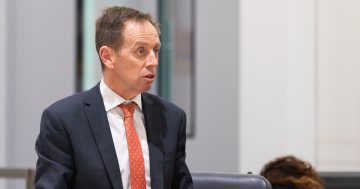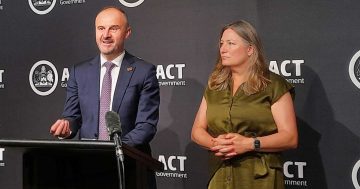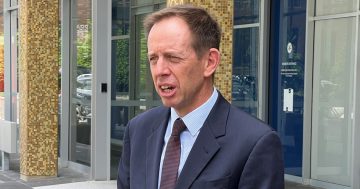
The ACT Greens celebrate the 2020 ACT election result. Photo: ACT Greens.
The ACT Greens have been on cloud nine for the past week but now it’s time to come down to earth and face the reality of having a role in government and the political grind of the Legislative Assembly.
They passed the first hurdle last week by opting to be in coalition with Labor instead of exerting pressure from the crossbench.
There is much more to be achieved by being inside the tent, as leader Shane Rattenbury has shown.
Part of their electoral success – and they should be careful not to overstate it – stems from Mr Rattenbury’s results-driven, common sense contribution to Cabinet, a record that has given the party valuable credibility.
Outside Cabinet, Caroline Le Couteur also worked hard on legislation and raising key planning and housing issues.
There is no doubt that they have pulled Labor towards clearer policy decisions on transport (light rail) and climate change and energy (renewables) to the point where Labor is reaping the electoral benefits of these popular decisions and making them their own.
The ACT Greens, unlike their counterparts federally and in other jurisdictions, have middle of the road appeal, and typically in a place like Canberra have attracted talent with the experience to do well in the Assembly.
They have been here before, from 2008 to 2012 when four Greens, including Mr Rattenbury, occupied the crossbench, only to see that electoral support evaporate.
Hare-Clark giveth and taketh away, and can be both generous and cruel. The Greens should remember that overall the party polled roughly 13.5 per cent for their six seats, while the Liberals at 34 per cent have had to settle for just nine.
This time around it appears that the Greens have taken votes off the Liberals, those who may not be happy with Labor but find something in the Greens’ message about planning, the environment and climate change.
This newfound support could easily disappear if the Greens let ideology distract them, forget the spade work and don’t achieve practical results, something the Liberals have failed to learn.
They will need to be pragmatic and be willing to compromise, because 100 per cent of nothing is nothing.
Chief Minister Andrew Barr was quick to remind them that Labor is the very senior partner, especially with 38 per cent of the vote, and that a second minister was not an immediate given.
Mr Barr said he would not want to throw someone in the deep end but that may have been just early positioning.
But the Greens will state their claims to have that extra say in Cabinet, with Rebecca Vassarotti or Emma Davidson capable of doing the job.
Labor is not so flush with talent that they can deny a Green that opportunity, particularly after losing Gordon Ramsay.
In fact, the experienced and proven Mr Rattenbury could well be the new Attorney-General.
The luxury for the Greens this time is having a team that can share portfolios and the work, and make more of a contribution. And that will also mean, for those outside of Cabinet, holding government to account and siding with the Liberals if need be.
In many respects it’s an extension of an experiment that is peculiarly Canberran because there is no love lost between Labor and the Greens elsewhere in the nation. But it’s a model that others outside the ACT are observing closely.
Its success at an ACT level will be judged on practical outcomes, not symbolic gestures, by an electorate that is savvy and sophisticated but still wants the rubbish picked up on time.
The Parliamentary Agreement to be hammered out should reflect that and set ambitious but realistic goals in housing, getting light rail done, securing the ACT’s energy needs and sorting out the waste management mess.
One thing is certain – it won’t be business as usual for Labor in the Assembly.




















